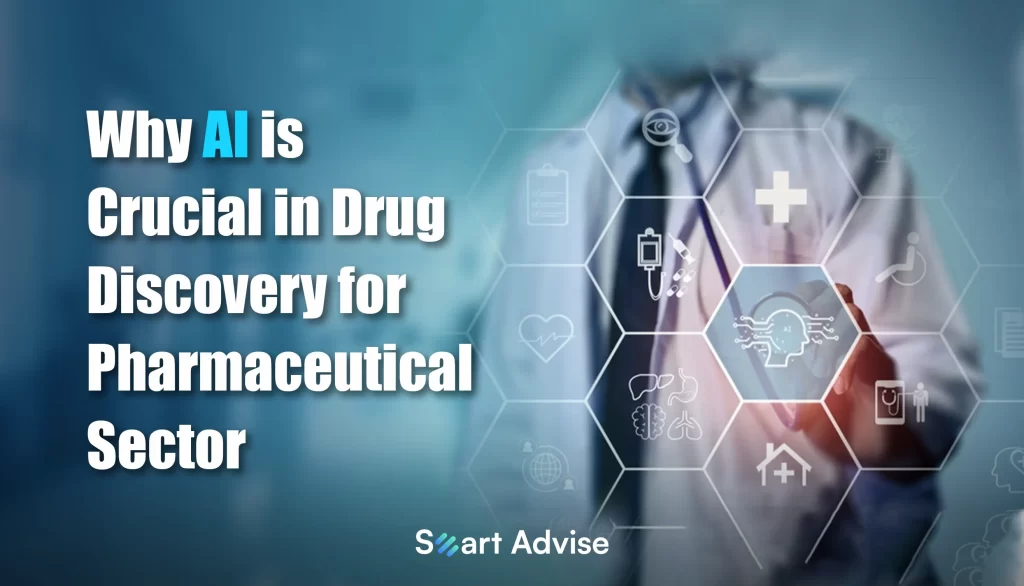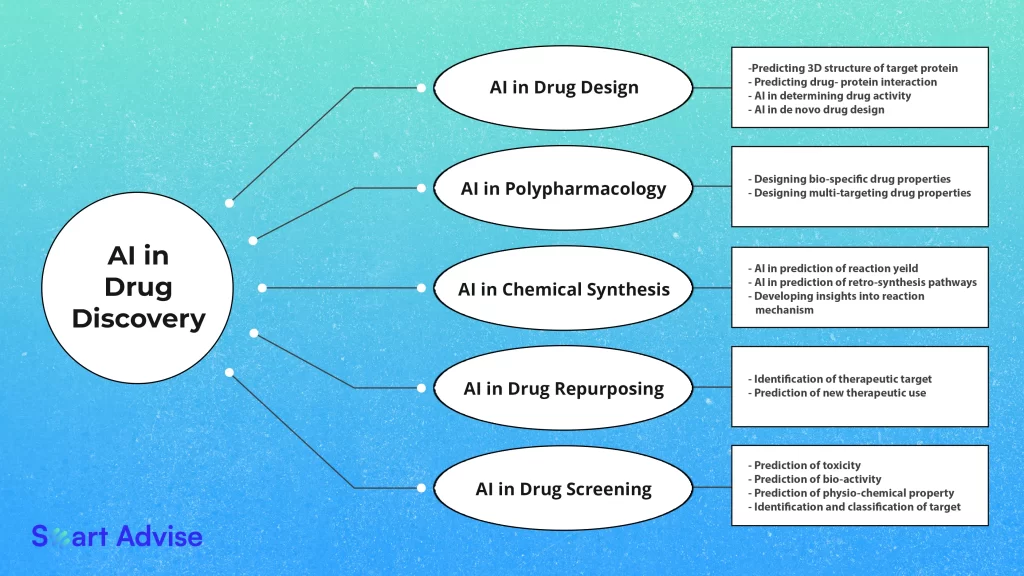
Discover more on untouched matter of how AI is transcending drug discovery in pharmaceutical
The pharmaceutical industry plays a vital role in improving global healthcare by developing new drugs and treatments for a wide range of diseases. However, traditional drug discovery processes have been notoriously slow, costly, and fraught with high failure rates. Enter Artificial Intelligence (AI), a revolutionary technology that has reshaped the landscape of drug discovery. In this blog, we will explore why AI is crucial in drug discovery for the pharmaceutical sector, highlighting its transformative impact on research and development.
Accelerating Target Identification and Validation
AI has the capability to analyze vast amounts of biological and genetic data, enabling researchers to identify potential drug targets more efficiently than ever before. With AI’s ability to sift through large datasets and identify promising targets, researchers can focus their efforts on targets with the highest likelihood of success, thus speeding up the initial stages of drug discovery.
Enabling Precise Drug Design and Optimization
The design and optimization of drugs are crucial steps in the drug development process. AI-driven algorithms can predict a molecule’s properties, such as its binding affinity to a target, its safety profile, and potential side effects. This capability aids in selecting the most promising drug candidates while reducing the need for costly and time-consuming trial and error.
Enhancing Virtual Screening
Virtual screening, a computational technique used to analyze vast databases of chemical compounds and predict potential interactions with drug targets, is a laborious process. However, AI-driven virtual screening algorithms have transformed this approach. By using machine learning models, AI can identify molecules with the highest likelihood of binding to specific targets, streamlining the early stages of drug discovery.
Repurposing Existing Drugs
AI’s ability to analyze and interpret complex data has opened new doors in drug repurposing. Through ample study of existing drugs and their mechanisms of action, AI algorithms can identify opportunities for repurposing them to treat different diseases. This approach saves time and resources, as repurposed drugs have already undergone some level of safety testing in humans.
Optimizing Clinical Trials
Clinical trials are a critical phase in drug development, but they can be expensive and time-consuming. AI can optimize this process by analyzing patient data and predicting potential responders, thereby improving trial designs and increasing the chances of successful outcomes.
A study published in National Institute of Health, the Phase II study using AiCure’s mobile software for monitoring patients’ regular medication intake for schizophrenia resulted in a 25% increase in the adherence rate of patients, assuring the trial’s successful conclusion.
Following infographic shows AI’s role in Drug Discovery Procedure:

Predicting Drug Toxicity
AI-driven models can predict potential drug toxicities in the early stages of drug development, enabling researchers to focus on safer drug candidates. This predictive capability significantly reduces the risk of adverse effects during later clinical trials and post-market use. According to a study published in National Institute of Health , AI approaches have shown great promise in identifying toxic compounds with high accuracy, thereby enhancing drug safety profiles.
Data Analysis and Integration
The pharmaceutical sector generates an enormous amount of data, including genomics, proteomics, clinical trials, and real-world evidence. AI excels in handling and analyzing these diverse datasets, enabling researchers to extract meaningful insights and discover previously hidden patterns and associations. By integrating and analyzing disparate data sources, AI can identify novel connections between disease pathways and potential drug targets, leading to more informed decision-making in the drug discovery process.
Drug Manufacturing and Quality Control
AI is not limited to the early stages of drug development; it also plays a crucial role in drug manufacturing and quality control. AI-driven optimization algorithms can streamline drug manufacturing processes, leading to more efficient production and reduced costs. These algorithms can analyze manufacturing data, identify potential bottlenecks, and suggest process improvements, resulting in higher yields and faster production times.
Moreover, AI-powered quality control systems can monitor the manufacturing process in real-time, ensuring the consistency and safety of pharmaceutical products. Identifying the deviations and anomalies, AI can help prevent defective batches from reaching the market and maintain stringent quality standards.
Drug Delivery and Formulation
The efficacy of a drug depends not only on its active pharmaceutical ingredient (API) but also on its delivery system and formulation. AI can play a role in optimizing drug delivery mechanisms, such as nanoparticles, liposomes, and micelles, to improve drug solubility, stability, and targeting. By simulating and predicting drug behavior within the body, AI can assist in designing drug formulations that maximize therapeutic effects while minimizing side effects.
According to a report by Markets and Markets, the global AI in drug delivery market is projected to grow at a CAGR of over 45% from 2022 to 2027, highlighting the increasing significance of AI in this aspect of drug development.
Ethical and Regulatory Considerations
As AI becomes increasingly integrated into drug discovery and development, ethical and regulatory considerations also come into play. Ensuring the responsible use of AI technologies and addressing potential biases in algorithms are critical aspects that the pharmaceutical sector must navigate. AI models trained on biased datasets may inadvertently perpetuate disparities in healthcare access and outcomes.
To address these concerns, regulatory bodies are working on guidelines and frameworks to ensure the ethical and transparent use of AI in drug development. Collaborative efforts between industry stakeholders, researchers, and policymakers are essential to establish standards that safeguard patient safety and uphold ethical principles.
Cost Savings and Competitive Advantage
The integration of AI in drug discovery brings about significant cost savings for pharmaceutical companies. By reducing the time and resources required for traditional trial-and-error processes, AI enables more efficient use of research budgets and accelerates drug development timelines. A study by Accenture found that AI could save the American pharmaceutical industry up to $150 billion annually by 2026.
Furthermore, companies that embrace AI early in drug development gain a competitive advantage. With quicker identification and validation of drug targets, more precise drug design, and faster clinical trials, they can bring innovative treatments to market ahead of competitors. This competitive edge is vital in an industry where the first-mover advantage can determine a drug’s commercial success.
Success in Drug Discovery Made Possible by AI (Published by Harvard University)
- Exscientia announced the first medicinal molecule developed by AI would be tested on humans in early 2020.
- AlphaFold, a DeepMind AI system, predicted the structures of 330,000 proteins in July 2021. This number included all 20,000 proteins in the human genome. Over 200 million proteins are currently represented in the AlphaFold Protein Structure Database, making it the largest and most comprehensive protein database to date.
- Phase I clinical trials for the first AI-discovered drug based on an AI-discovered novel target began in February 2022, according to Insilico Medicine. This was accomplished in a quarter of the time and cost of conventional preclinical programs.
- AbSci was the first company in January 2023 to “create and validate de novo antibodies in silico” by employing generative AI.
- Insilico Medicine, the company responsible for the first treatment to receive Orphan treatment Designation from the FDA after being found and built with AI, wants to launch a global Phase II trial for the drug “early” in 2023.
To sum it all…
Artificial Intelligence has emerged as a game-changer in drug discovery for the pharmaceutical sector. By accelerating target identification, enabling precise drug design, enhancing virtual screening, and optimizing clinical trials, AI has already revolutionized the drug development process. Additionally, its contributions to drug repurposing, toxicity prediction, personalized medicine, data analysis, drug manufacturing, and drug delivery are transforming the entire pharmaceutical ecosystem.
As AI technologies continue to advance, the pharmaceutical industry must embrace this transformative power to improve patient outcomes, bring new and innovative treatments to market, and tackle some of the most challenging diseases of our time. With the right ethical considerations and collaborative efforts, AI can reshape drug discovery and propel the pharmaceutical sector into a new era of medical innovation and progress. To get more researched analysis on diverse subject matter connect with us now!